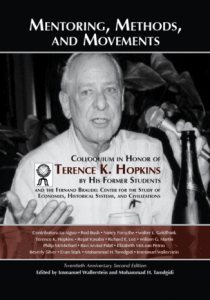Advancing Utopistics: The Three Component Parts and Errors of Marxism
$65.00 – $125.00
Advancing Utopistics: The Three Component Parts and Errors of Marxism is a contribution to the emerging field of utopistics in world-systems studies. In this work Tamdgidi problematizes the foundational structures of knowledge that have shaped Marxist method, theory, practice, and historical imagination over the decades and are arguably still framing the broad contours of intellectual discourse and research in world-systems studies. Appreciating the humanist utopian spirit that originally inspired the neither idealist nor materialist young Marx, the study concludes by advocating a broader, alternative paradigm for comparative/integrative research in utopia, mysticism, and science (utopystics) to advance utopistics in favor of a just global society.
Note: The ePub ebook edition of this title can be purchased from Routledge and other online ebook stores worldwide.

All the sections of this publication can be read online by logged-in members of the OKCIR Library with a valid access. In that case click on any section in the table of contents below, and then click on the large PDF icon at the bottom of that page to access the publication section. Alternatively, you can purchase this publication as offered below.
Description
Advancing Utopistics: The Three Component Parts and Errors of Marxism
Author: Mohammad H Tamdgidi
Advancing Utopistics: The Three Component Parts and Errors of Marxism is a contribution to the emerging field of utopistics in world-systems studies. In this work Tamdgidi problematizes the foundational structures of knowledge that have shaped Marxist method, theory, practice, and historical imagination over the decades and are arguably still framing the broad contours of intellectual discourse and research in world-systems studies. Appreciating the humanist utopian spirit that originally inspired the neither idealist nor materialist young Marx, the study concludes by advocating a broader, alternative paradigm for comparative/integrative research in utopia, mysticism, and science (utopystics) to advance utopistics in favor of a just global society.
Mohammad Tamdgidi is the Founding Director of OKCIR: The Omar Khayyam Center for Integrative Research in Utopia, Mysticism, and Science (Utopystics). He has been an Associate Professor of Sociology teaching social theory at the University of Massachusetts Boston.
Publisher: Routledge (Taylor & Francis Group)
Hardcover and Softcover- 336 pages, 21 figures, index.
Publication Dates: hardcover 2007/paperback 2009
ISBN (paperback): 9781594513862 (2007)
ISBN (hardcover): 9781594513855 (2009)
ISBN (ebook): 9781315636146 (2015)
The various editions of this book are also available for ordering from Routledge (Taylor & Francis Group) and all major online bookstores worldwide.
More About the Book
Inspired by Immanuel Wallerstein’s Utopistics, this book shows why utopistics cannot advance without sober and self-critical revisitations of its own intellectual heritage. Most sympathetic critiques of Marxism have targeted the shortcomings in its practices and/or theories (including its materialist conception of history), while regarding Marx’s materialist dialectical method as sacred ground. Through a succinct analysis of the inner contradictions of the three practical, theoretical, and methodological tenets of classical Marxism, Tamdgidi argues that the root causes of Marxism’s decline must be sought in Marx’s method itself.
This book concludes with a critical reexamination of the relation of Marxism and utopianism, arguing that Marx and Engels’s debunking of utopianism in contrast to science had more of an ideological function than substantive merits, an ultimate error that set back the cause of advancing alternative strategies for radical social change for decades. The study invites serious considerations of non-Western teachings through open-minded explorations of Western utopianism in comparative/integrative dialogue with Eastern mysticism and scientific discourses on utopistics—proposing a further metamorphosis of Wallerstein’s concept “utopistics” into “utopystics” (a hybrid concept signifying comparative and integrative explorations of utopia, mysticism, and science).
A substantial methodological appendix is devoted to the exposition of a non-reductive, creative dialectical method more conducive to advancing utopistics and world-system studies.
Reviews of Advancing Utopistics: The Three Component Parts and Errors of Marxism
“In Tamdgidi’s critical study of Marxism and its troubled relationship to utopianism, ‘the pull between what is and what should be’ is re-explored creatively, resulting in a new and promising utopystics, shorn of limiting dualisms and conceits. An equally rigorous and hopeful book.”
–Avery F. Gordon, University of California, Santa Barbara
“Tamdgidi does the field of Marxist critique a great service…. Tamdgidi’s suggestion – that utopistics must be a creative endeavor to which all forms of knowledge and experience, Western and Eastern, scientific or otherwise, can and should critically contribute – is a major advance in the field of world-systems studies.”
–Peter McLaren, Graduate School of Education and Information Studies, University of California, Los Angeles
“The argument of Dr. Tamdgidi’s book, that anti-utopianism in the form of radical materialism of the later Marx jeopardizes the creative dimension of dialectical thought, offers a critique and theoretical response rooted in the complex forces of the self as lived. The work is a contribution in Marxist social thought, in that it is a part of the stream that offers arguments for reconsidering the early Marx, but it is also a work in agency-oriented dialectical social thought.”
—Lewis R. Gordon, Laura H. Carnell Professor of Philosophy at Temple University and the Jay Newman Visiting Professor of Philosophy of Culture at Brooklyn College
“All of Professor Tamdgidi’s broad knowledge in world-history and East/West epistemologies are powerfully condensed in Advancing Utopistics. His book is a tour-de-force in several fields of scholarship such as world-systems, sociology of knowledge, and Marxist sociology, recasting both Mannheim’s and Wallerstein’s concept of utopia. Here he develops a radical critique of what he calls the three component parts and errors of Marxism … His recasting of the dialectical method beyond the binary of idealism vs. materialism is an original and crucial contribution to sociological theory.”
—Ramón Grosfoguel, Professor, Department of Ethnic Studies, University of California at Berkeley
Table of Contents of Advancing Utopistics: The Three Component Parts and Errors of Marxism
Introduction : Advancing utopistics 1
Ch. 1: Dictatorship of the “proletariat”? 16
Ch. 2: Economically inevitable transition? 45
Ch. 3: Either idealist or materialist dialectics? 73
Ch. 4: The opposition of idealist and materialist outlooks 96
Ch. 5: The neither idealist nor materialist Marx 126
Ch. 6: The component errors as a whole 151
Ch. 7: Marxism and utopia 181
Conclusion : Toward utopystics 212
Appendix: The creative dialectical method 226
I Interpreting Dialectics Dialectically 226
II Splitting the Creative Research Labor Process 230
III Dialectical Methodology: Dialectics of Dialectical Ontology and Epistemology 243
IV Dialectics of the Creative Research Labor Process as a Whole 283
V Dialectics of the Development of “Dialectics”: A Historical Outline 287
VI The Creative Dialectical Method 296
Bibliography 299
Index 311







